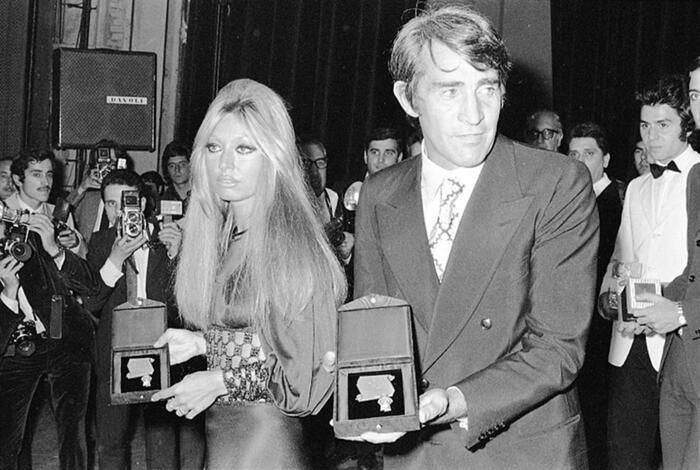On the occasion of the centenary of his birth, Italian culture remembers, after a long and unjust oblivion, Walter Michele Armando Annichiarico aka Walter Chiari.
Veronese by birth (8 March 1924), Apulian by origins (his father Carmelo was a police sergeant and came from Grottaglie), Milanese by adoption, without roots with his cosmopolitan artistic nature, Walter Chiari remains unique and indefinable in his actor's journey.
He made 112 films, but Italian cinema never really adopted him despite his debut in 1946 ("Vanity" by Giorgio Pastina), the call from Luchino Visconti ("Bellissima", 1951) and his personal success with Blasetti (" Me, me, me and... the others", 1966).
In the theater he was a star of musical comedy and revue theater (his successes were incredible in "Buonanotte Bettina", "The Owl and the Kitty", "A Mandarin for Teo" between the 1950s and 1960s), but also a charismatic prose actor (from "The Odd Couple" with Renato Rascel in 1966 to "Endgame" by Beckett twenty years later).
He owes his success above all to the TV of which he became a regular protagonist since 1958 when he appeared together with Carlo Campanini with his workhorse, "Il Sarchiapone" which he proposed every time with additions, modifications, inventions in a continuous flow of improvisation.
From then on and for over 10 years he was a brilliant showman and experimenter between "Studio Uno" with Antonello Falqui as director, "Canzonissima" with Mina and Paolo Panelli, up to "Speciale per voi".
Precisely in that studio, in 1970, he was caught by the police on charges of possession and dealing of drugs, then remaining in prison for 98 days until he was acquitted of the charge of dealing and received a suspended sentence for drug use.
Years later he openly admitted that he had used cocaine, saying that since the first post-war period there had been a lot of it in circulation in the theater ("the dancers who had to support Wanda Osiris helped each other like this every evening"), but that he had never, ever employee or drug dealer.
For ten years Rai closed all its doors to him, while public opinion did not seem to forgive him for a life outside the rules, while cinema and the nascent private broadcasters did not offer him the opportunity to return to the success of the past.
When things seemed to be going the right way again, in 1985, once again a repentant - the same one who accused Enzo Tortora - sent him back before the judges accusing him once again of trading cocaine.
Already acquitted during the investigation, Walter Chiari was nevertheless destroyed by that affair and from then on began a decline which ended, on the night of 19 December 1991, with a heart attack.
He was found lifeless the next morning in his residence in Milan.
To understand what made Walter Chiari a unique and unrepeatable performer on the Italian scene, we need to delve into his controversial and complex educational history.
A rebellious student in Milan where the family had moved when little Walter was nine years old, he soon left his studies dividing his time between a thousand jobs (warehouse worker, electrical technician, bank clerk, reporter, caricaturist) and a promising sporting career: he was a good lightweight boxer , but was forced to leave after the title of Lombard Featherweight champion in 1939, tennis player, swimmer, even bowls champion.
He resumed his studies, obtained a diploma from a scientific high school, but was forced by the war to abandon university in 1943. Precisely that dramatic moment in Italian history marked his subsequent years: he enlisted in the German army ending up in Normandy and then captured by the allies who took him to a prison camp near Scandicci.
In 1946 he became a free man again and returned to the theatre, immediately making himself noticed by a magazine queen like Marisa Maresca who wanted him in the cast of "Se ti kisses Lola".
He moved to Rome, definitively embarking on a career as a magazine comedian.
Thanks to a natural talent, the storytelling of a great improviser, and a perfect ability to imitate the most diverse dialects, he quickly constructed an original mask, which was then exploited to the fullest on TV.
In short, he was an out-of-time actor, capable of exceeding every limit (him first), hungry for consensus and love.
He always appeared on stage with the lost air of an awkward student, and then provoked laughter and affection without measure.
In the TV of the 60s it generated an authentic cataclysm thanks to its ability to be both international and local, with an art of experimentation that was well suited to that innovative phase of the young state television;
at the cinema he was less fortunate because he was almost always relegated to supporting roles, almost as if his directors (often also of great caliber such as Monicelli, Damiani, Steno, Risi, Scola, even Orson Welles) did not believe in him as a protagonist.
In the end, what is celebrated more than his talent is his love affairs (many for the most envied bachelor in Italy from Elsa Martinelli to Ava Gardner up to his stormy marriage with Alida Chelli and his last partner Patrizia Caselli), his excesses, his contagious sympathy.
Milan dedicated a park to him, his son Simone told him about it in a beautiful book that traces his life and career, he himself was represented in the television hoax "Story of another Italian" with Tatti Sanguineti;
now the Rai thematic channels are showing some of his most successful improvisations.
He was a popular hero, simple and profound, a liar and a squanderer, absent-minded and irregular.
However, he is always unique and his legacy finds faithful followers (Teo Teocoli first and foremost), but no true successor.
Reproduction reserved © Copyright ANSA

